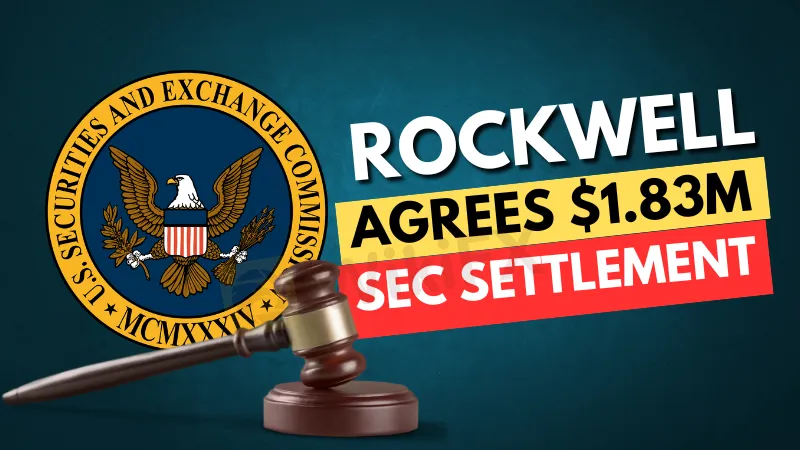简体中文
繁體中文
English
Pусский
日本語
ภาษาไทย
Tiếng Việt
Bahasa Indonesia
Español
हिन्दी
Filippiiniläinen
Français
Deutsch
Português
Türkçe
한국어
العربية
Rockwell Agrees $1.83M SEC Settlement
Abstract:SEC settles for $1.83 million with Brian Sewell and Rockwell Capital over a fraudulent scheme involving 15 students and the non-existent Rockwell Fund.

The US Securities and Exchange Commission settled with Brian Sewell and Rockwell Capital Management for $1.83 million after accusing Sewell of defrauding 15 students of $1.2 million. The case has brought attention to the risks associated with cryptocurrency investments, especially when they come with unverified claims of cutting-edge trading strategies.
The issue originates from Sewell's establishment of the American Bitcoin Academy, an online course that claimed to teach students the subtleties of bitcoin trading. In early 2018–mid-2019, hundreds of his students believed in the Rockwell Fund. This hedge fund was projected to be a game-changing investing platform that would leverage AI and crypto-asset trading algorithms to generate high profits for its investors.
However, the SEC's inquiry into these assertions revealed a quite different reality. The inquiry proved that Sewell's claims were hollow: the Rockwell Fund never existed, and the complex trading tactics he spoke about were never established or applied. The cash gathered from the 15 pupils, totaling roughly $1.2 million, was redirected into Bitcoin ventures. The Bitcoins were stolen from Sewell's digital wallet, causing the assets to be lost.

Given these findings, the SEC filed a lawsuit against Sewell and Rockwell Capital Management for breaching federal securities laws' anti-fraud provisions. The case highlighted the importance of regulatory supervision in the fast-growing cryptocurrency market and the risk of substantial losses from misinformation-based investments.
Sewell and his company settled rather than contest the SEC's allegations. They agreed to pay $1.83 million in fines and prejudgment interest to settle the fraud charges against them. This settlement compensates the affected students and deters future fraud.
The SEC's Division of Enforcement Director, Gurbir S. Grewal, underscored the misleading nature of Sewell's acts, including false guarantees and nonexistent technology that Sewell utilized to entice investors into his scam. This example advises investors against high-return investments, especially in volatile and opaque cryptocurrencies. They should be cautious and critical to avoid such frauds.
Keep up with financial trends, expert opinions, and major developments at https://www.wikifx.com/en/news.html. Click now to stay ahead of the competition!

Disclaimer:
The views in this article only represent the author's personal views, and do not constitute investment advice on this platform. This platform does not guarantee the accuracy, completeness and timeliness of the information in the article, and will not be liable for any loss caused by the use of or reliance on the information in the article.
Read more

Are Trading Courses and Mentors a Fast Track or a Financial Trap?
In recent years, trading has become more popular than ever. Social media is full of people showing off their “trading lifestyle” with expensive cars, luxury holidays, and promises of easy money. Many of them claim to be mentors, investment coaches, or run online trading academies. They say they can turn beginners into full-time traders in just a few weeks. But is it true, or is it just a clever scam?

Gold Prices Pull Back, Near Four-Week Low Amid Easing Risk Sentiment
As risk aversion fades and investors turn their attention to U.S. inflation data, gold prices retreat sharply, falling to their lowest levels in nearly a month.

Using Any of These Illegal Forex Trading Apps? Stop Before It Turns into a Crisis
The Reserve Bank of India (RBI) has listed out some illegal forex apps India. Read this article to know some of those apps.

IC Markets Sponsors AEL Limassol, Football Club Until 2027
AEL Limassol has renewed its deal with IC Markets (EU) Ltd, who will stay as the team’s Gold Sponsor until 2027. The sponsorship deal was first announced for the 2025–2026 season, but it has now been officially extended until 2027.
WikiFX Broker
Latest News
PU Prime and AFA Announce Partnership at Madrid Event
ASIC Warns of Escalating Share Sale Scams Amid $119M Scam Losses
Top 5 Forex Brokers Offering Islamic Accounts in 2025
A Guide to RBI Forex Rules in India
“Wins with $19,916 weekly profit on Exnova”? There is something you should know.
Oil Prices Slide After Cease-Fire
Clones of ThinkMarkets Are Lurking | Don’t Fall for the Fake
How Macro Events Drive Energy Price Fluctuations and Their Linked Impact on the Global Forex Market
IQ Option: Regulation, Warnings, and What Traders Need to Know
TSMC to Inject $10 Billion into Overseas Subsidiaries
Currency Calculator


